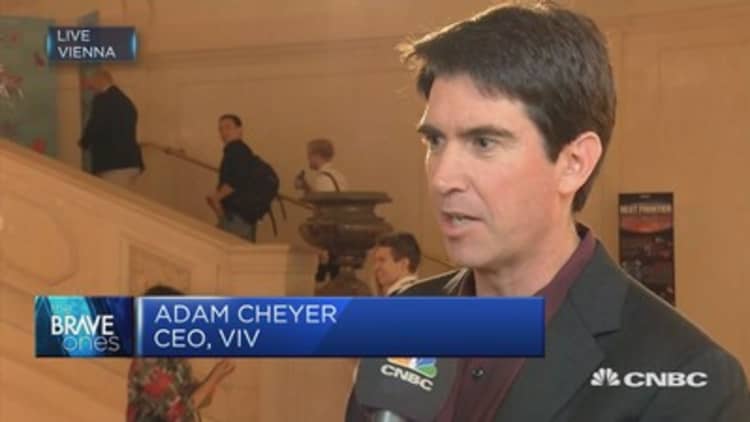
Apple is still a "major player" in the voice assistant space with Siri, one of the technology's co-creators told CNBC on Friday, despite the U.S. technology giant receiving criticism for falling behind rivals Amazon and Google.
Adam Cheyer was one of the people behind Siri which was acquired by Apple in 2010. Since then, Cheyer has created a next generation voice assistant called Viv which was acquired by Samsung in 2016. Viv is now a wholly-owned subsidiary of Samsung with the South Korean titan looking to integrate the technology into future products.
Voice assistants have become the next battleground for technology giants. Amazon's Alexa, which is in products such as its Echo home speaker, is perceived to be the leader, while Google Assistant is gaining traction.
But Apple has been slated for not keeping up with the competition.
"In our
Cheyer, however, said Apple is still very much in the game but the ultimate winner will be the company that can turn their voice assistant into a technology across multiple devices.
"I am very proud of what we accomplished to initially take this new paradigm and bring it out to hundreds of millions of people. I think Apple is doing good work and is still a major player in this race," Cheyer told CNBC in a TV interview on Friday.
"What's going to matter is which companies can elevate an assistant from where it is today, a utility … to be this ubiquitous paradigm and I think Apple and everyone else is in the game and it will be great for consumers no matter who wins."
Of course, Cheyer is making a rival product to Apple's Siri for Samsung. He was tightlipped on the product roadmap, however. Samsung's latest phone, the Galaxy S8 has an artificial intelligence assistant built in called Bixby. It allows
Bixby is reportedly built on Samsung's own technology and not Viv's, but the two are likely to integrate.
"We are working on a next generation assistant and we will deliver it through Samsung's devices, perhaps under the Bixby brand eventually but also to other interfaces," Cheyer said.
The plan is to try and get Viv's technology across a number of devices, not just smartphones, but also home appliances and other gadgets.
"Right now there is a race to the single interface where all of the big companies Microsoft, Apple, Amazon and now Samsung are trying to make the assistant the next paradigm like the browser, like the smartphone, you'll have an assistant to help you in your lives," Cheyer said, explaining the company's ambition.
Amazon has made a similar play. Earlier in the
Viv has similar ambitions and plans to open the platform up to developers so they can make apps and find other uses for the voice assistant.
"You will be able to do everything you do for computing through an assistant interface," Cheyer said.
—Correction - This story was updated to fix a typo and show Viv is now a wholly-owned subsidiary of Samsung.





